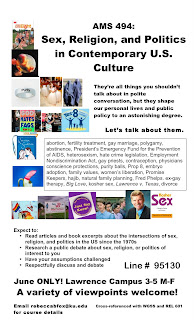Summer 2009 offers an exciting range of AMS courses, especially for majors trying to complete requirements. If you are an AMS major who declared late in your KU career, you can pick up two core required courses in summer 2009. If you have completed your core and are working on a concentration, be sure to check out the upper-level topical courses for something in your area of interest. Courses are scheduled in a variety of formats, including an intensive one-month session with daily meetings, to fit a diverse schedules. All courses are now online on the
KU schedule of classes; just search for AMS in Summer 2009.
The AMS summer schedule is also a chance to take care of non-major requirements. AMS 110 is a Principal Course in Culture & Society (SC). For other interdisciplinary majors that require social science or humanities blocks, all the core courses this summer are designated as social science (S) and the topics courses are all humanities (H).
New this summer, AMS will offer several courses at the
Edwards campus in Overland Park. KU Edwards courses are scheduled in the afternoon and evening, with longer and less frequent meetings, to cater to students who have to balance work or family responsibilities with their studies.
Core CoursesAMS 110-American Identities will be taught by veteran lecturer Ray Pence, and offers a small-format alternative to what is usually the largest AMS lecture class. AMS 332-U.S. in a Global Context will be offered in two sections: Ashley Jelks will teach one at Lawrence and Liz Yeager will offer her version at Edwards.
Topics CoursesIn addition to these core courses, a number of topical listings draw on the specific expertise of our instructors, including Rebecca Barrett-Fox's AMS 494-Sex, Religion, and Politics in the Contemporary U.S., and Megan Willams's AMS 494-Blacks and Jews in the United States. AMS core faculty member Dr. Tanya Hart will also contribute AMS 511-History of American Women 1870-present.
Cross-Listed CoursesAs is always the case, AMS has the good fortune to cross-list courses with other departments. This summer the cross-listings include courses out of Women, Gender, and Sexuality Studies and Theatre and Film:
- AMS 344-Gender, Sexuality and the Law (Milton Wendland)
- AMS 344-Lesbian and Gay Cultures of the Contemporary U.S. (Milton Wendland)
- AMS 344/696-Popular Culture of the 1970s (Chuck Berg)
Chuck Berg's Popular Culture course can be taken for upper-level or graduate credit. Contact the instructor for information on the assignment expectations for each.
These courses will be detailed in the Summer Course Guide, to be released shortly. Stop by the AMS office to pick up a copy, or check back in this space for a download.











